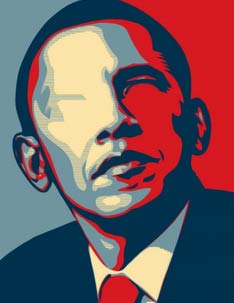
In his final State of the Union address, President Obama returned to the optimism that he personified in his first campaign - but applied it only to America.
For the rest of the world, Obama was pessimistic, even fatalistic. It is as though the only way he can process his failure in Syria, and the vast humanitarian catastrophe still unfolding there, is to convince himself that failure was inevitable and will be repeated many times.
"The Middle East is going through a transformation that will play out for a generation, rooted in conflicts that date back millennia," Obama said.
And "instability will continue for decades in many parts of the world - in the Middle East, in Afghanistan, parts of Pakistan, in parts of Central America, in Africa, and Asia."
Why would a president ask Americans to assume that the problems of Central America, say, are intractable and inevitable? Of the region's seven small nations (total population: 42 million), some, such as Costa Rica, have been enviably stable for decades. Others, it's true, have problems: gang violence in El Salvador; corrupt, pseudo-leftist, Venezuela-fueled authoritarianism in Nicaragua.
But Mexico, with far more entrenched challenges, has in 20 years moved from an apparently hopeless case to a lower-middle-class nation grappling with its still serious problems by means of a multiparty democracy - and attracting more returning migrants than it sends north. Why would we assume that El Salvador or Honduras can't accomplish as much?
If Obama wants to think in decades, why not look back to South Korea, which not so many decades ago was an impoverished military dictatorship that development experts generally despaired of? Or Estonia, three decades ago a similarly impoverished captive of the Soviet Union?
Today, both are prospering democracies. And as unlikely as their successes might have seemed decades ago, no U.S. president would have written them off. On the contrary, it was the U.S. commitment to a peaceful democratic future for both their regions, on opposite sides of the globe, by presidents as different as Jimmy Carter and Ronald Reagan, that paved the way for their success.
Why would Obama set his sights lower for Afghanistan or Africa?
Age-old conflicts are a reliable default excuse. Yes, Shiite-Sunni strife dates back centuries. But "ancient hatreds" exist everywhere, from Northern Ireland to South Carolina to Alsace-Lorraine. Whether they are managed or explode is the result of political choices. It is not a matter of destiny.
The late diplomat Richard Holbrooke, in his memoir on negotiating an end to the Balkan war, recalls Deputy Secretary of State Lawrence Eagleburger declaring in 1992, "Until the Bosnians, Serbs and Croats decide to stop killing each other, there is nothing the outside world can do about it."
The excuse then, too, was a theory of "ancient hatreds," Holbrooke wrote, 100,000 deaths later.
"Those who invoked it were, for the most part, trying to excuse their own reluctance or inability to deal with the problems in the region," he wrote. "Yugoslavia's tragedy was not foreordained. It was the product of bad, even criminal political leaders. . . . Once they realized that the United States, at the height of its global influence, was disengaged, they proceeded rapidly on their descent into hell."
Obama's confusion about Syria is evident and understandable. Four years ago his senior advisers supported a modest intervention to forestall a civil war that might spin out of control, spreading beyond Syria's borders and fostering extremism.
The president rejected their counsel, and the results are more dire than anyone could have imagined: Hundreds of thousands dead. Millions displaced. The entire continent of Europe strained by refugee flows and terrorism. Children starving to death.
In his end-of-year news conference last month, Obama seemed to acknowledge the disaster when he defended his Libya intervention by saying that, without it, "we could have had another Syria."
But in an almost surreal moment Tuesday night, he pointed to Syria as an example of his "smarter approach, a patient and disciplined strategy that uses every element of our national power."
"That's our approach to conflicts like Syria, where we're partnering with local forces and leading international efforts to help that broken society pursue a lasting peace," the president said.
It is sad enough that the United States, having pledged after Rwanda to "never again" allow such a humanitarian catastrophe, stands aside while a nation is destroyed. It would compound the damage if the country allows itself to be convinced that this is the best we can do.



 Contact The Editor
Contact The Editor
 Articles By This Author
Articles By This Author